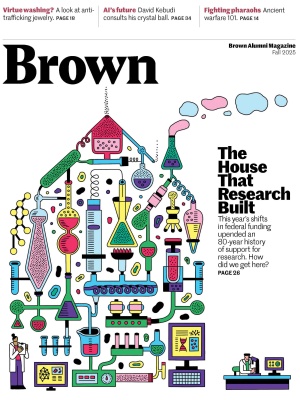The first pages of No One Gets to Fall Apart, the well-reviewed debut memoir by Sarah Labrie ’07, are harrowing on several levels.
In a short scene-setting anecdote, Labrie, who lives in Los Angeles, recounts a call from her grandmother back home in Houston about her mother having been found pulled over on the side of the freeway, honking her horn, her car filled with notes. She was convinced federal agents were out to kill her and was so frightened that she’d spent a day at George Bush International Airport, hoping that video cameras would document anything that happened to her.
Labrie reckons not only with the new understanding of her mother’s fragile mental health—she was diagnosed with schizophrenia—but with guilt over her own absence. Opening her calendar, Labrie found that “I was home writing and feeling bad about not going to the symphony while my mother was in a car on the side of the road begging someone to save her life.”
And then there was the personal fear the incident invoked, which took physical form in numbness.
“I wonder if the fact that my mother has succumbed to psychosis is making my body believe it can, too,” she wrote. “If my mind believes it is free to do whatever it wants without me, then who am I to stop it? What do I stop it with?”
More than anything else, this memoir is about inheritance in every sense: racial, financial, familial, and psychological.
One running theme is generations of unaddressed mental illness; Labrie’s grandmother was and remains a rock, but when Labrie gently suggests that she seek help, she shoots back: “Black people don’t go to therapy. Black people fake it ’til they make it.”
Another is the challenge of fully unleashing creativity—in Labrie’s case, finishing her first novel —without having dealt with one’s own issues.
It was a love of creative writing that brought Labrie to Brown. She studied experimental writing and went on to forge a varied career; she’s published essays and written librettos and, at the urging of her filmmaker husband’s manager, started writing for streaming TV shows including HBO Max’s Made for Love.
“Any creative opportunity someone presents to me, I tend to say yes to,” she says.
Her shift to writing about herself was, in part, a coping mechanism.
“I stopped being able to engage with fiction; it just seemed so pointless,” she says. “When my mom started having hallucinations, I couldn’t find any books, and so I just thought, well, I’m going to write exactly what is happening, and then maybe the next person will realize, ‘Okay, I’m not the first person in this situation.’”
And that, she says, is what has happened.
“I was very anxious about how it would be received,” she says, “and it’s been surprising and really lovely—the kinds of conversations it’s sparked, and people’s openness and willingness to talk about these difficult nuances.”






